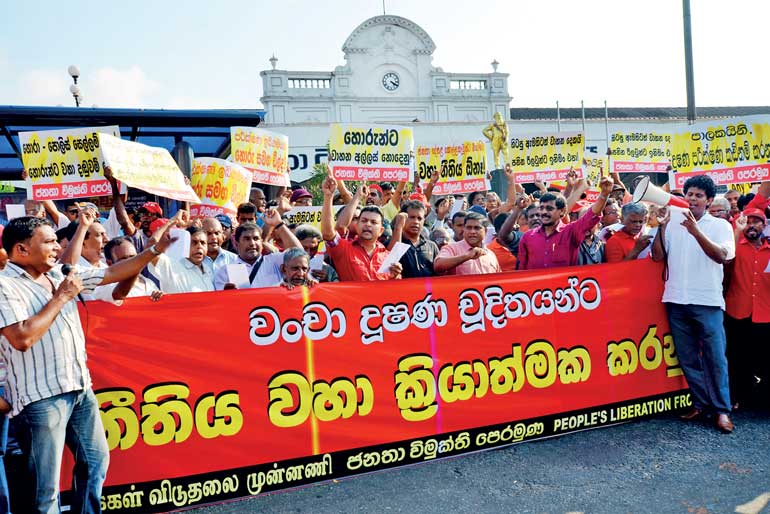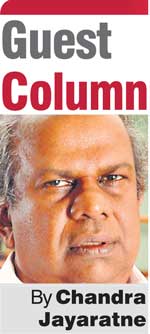Tuesday Feb 24, 2026
Tuesday Feb 24, 2026
Thursday, 21 December 2017 00:00 - - {{hitsCtrl.values.hits}}
 The shocking information revealed before the Bond Commission, the shocked conscience of the Supreme Court on the coal tender, the recent revelations on highways, petroleum and fertiliser tenders and other numerous high profile investigations of the present and past regime, reflects how badly independence, integrity and capability have been impacted by key executives in decision making; thus violating at will and disregarding applicable financial and administrative regulations, approved procurement and good governance guidelines – Pic by Shehan Gunasekara
The shocking information revealed before the Bond Commission, the shocked conscience of the Supreme Court on the coal tender, the recent revelations on highways, petroleum and fertiliser tenders and other numerous high profile investigations of the present and past regime, reflects how badly independence, integrity and capability have been impacted by key executives in decision making; thus violating at will and disregarding applicable financial and administrative regulations, approved procurement and good governance guidelines – Pic by Shehan Gunasekara
Our wake up:
The village farmers’ tale
“Wetath, niyarath, goyam ka num, kaata pavasami eh amaruwa,” is a commonly used saying of the village farmers. This saying adapted with the extension to read as, “If the fence, the bund, the mud, the water and the fertilisers, all start eating the paddy, O god, to whom can the farmers complain?” is an apt phraseology to describe the unfortunate position of the Sri Lanka citizenry are facing today.
The UNDP Resident Coordinator’s message on International Anti-Corruption Day on 9 December 2009 read: “No country is immune from corruption, and with economies larger and ever more intertwined, the potential risks and costs of corruption are increasing. It is for this reason that the member states of the United Nations came together and adopted the United Nations Convention against Corruption (UNCAC) through resolution 58/4 of 31 October 2003. Sri Lanka was the first country in Asia to sign the Convention, which today has 141 State Parties. It’s the fastest ratified international treaty ever and it clearly demonstrates a global consensus on what countries should do to prevent and criminalise corruption, to improve international cooperation in combating corruption, and to recover assets. Many consider it a revolutionary step in international criminal law, a ground-breaking and innovative tool to promote good governance.”
Much water and very much more of corruption, systems abuse, policy capture corruption, bribery, money laundering, and illegal transfer of State property, have been witnessed in our society over the last decade. Opportunities have existed throughout this period for criminal elements to engage in many arrangements for concealing, disguising, conversion, transfer of criminal property or terrorism linked financing: instead of such windows being closed and controlled, in fact even new windows have been opened (an example is the decriminalisation of the misuse of foreign exchange and making foreign exchange related money laundering not a predicate offence under the Prevention of Money Laundering Act) and the culprits allowed to get away scot free, at times mocking at the law enforcement officials and good governance activists.
The facilitators
of corruption
The fence, the bund, the mud, the water and the fertilisers eating the paddy are none other than the politicians/legislators, the executive arm of governance, the professional, business persons, and civil society (including religious leaders and the media). Their actions and inactions over the last decade, especially the appalling silence of so-called good men and women of our society, have led to the state of affairs we are in now. Their present attitudes/actions and their future commitments, do not give us citizenry any hope of Sri Lanka being a corruption, nepotism and waste free nation in the years to come.
Where are we? And where have we come from?
The Basel Anti Money Laundering Index measures the risks of money laundering and terrorist financing of countries based on publicly available sources. A total of 14 indicators dealing with Anti Money Laundering/Combating Financing of Terrorism regulations, corruption, financial standards, political disclosure and the rule of law are aggregated into one overall risk score.
In terms of this publication1, Sri Lanka is ranked in 2017 as the worst 25th Nation in the league. The Transparency International Corruption Perception 2016 Index2 placed Sri Lanka in the 95th position out of 176 countries. In 2009, Sri Lanka was 97th out of 180 countries and in 2005 Sri Lanka was 78th out of 158 countries. Sri Lanka’s relative ranking does not appear to have radically changed over the period 2005 to 2016 though under the baton of two regimes with distinctly differing core commitments.
The ranking of 88 (98) Developing Countries according to size of the Shadow Economy estimated by the World Bank3 for the period 1999 to 2006 shows an average size of the shadow economy at 44% and places Sri Lanka at the 70th (73rd) positions. The data set of an earlier academic study conducted over three distinct separate periods, when connected in a graph and extended brings the current estimate of Sri Lanka’s shadow economy to be well over 55%.
Sri Lankan Customs has seized six shipments of high-purity South American cocaine in 14 months; including Asia’s largest-ever haul of the drug in December, at its main port. “Sri Lanka is becoming a hub for cocaine as it is a risk-free location with less legal restrictions,” a top Police official, who is aware of investigations into the smuggling, told Reuters this week4.
All of the above indicators support the hypothesis that the five stakeholders identified earlier have continued to eat the paddy over the last decade and more. This is an appalling state of affairs as it is even despite the election of a good governance committed regime in 2015.
Looking back at the role of the key driver stakeholders
The politicians of all parties appear united and of one mind to ensure that those in power exercise their authority and decision making capacity to advance the personal interests of themselves, their families, network cronies, and also their political parties and succession within such parties. The leaders of the political parties have structured the organisation and decision making within the political parties to assure dictatorial and unbridled power vesting in the respective leaders. These public institutions thus lack inner party democracy that they vouch to uphold at a national level. The most tragic revelation is that even when out of power and severely challenged and pursued by the law enforcement authorities and the judiciary, these politicians find the unseen hands of support to evade the application of the rule of law and justice.
The politician legislators elected to office as Cabinet ministers have arrogated to themselves power, in terms of the 1972 Constitutional Amendment, of direction and control of the secretary of the ministry, who is also the chief accounting officer of the ministry .This empowerment is exercised widely irrespective of the capability (knowledge, skills, attitudes and values) of those elected to hold such office, and this empowerment has been the forerunner of the tragic story of missed opportunities and bad governance seen over the last 45 years.
This unbridled power in the hands of ministers in the exercise of supervision over the departments of Government and other institutions in charge of the minister, associated with the power to change the secretary at their whim and fancy, has been a significant contributor to the ever-increasing levels of bribery, corruption, nepotism and waste seen since 1972.
These politicians and ministers have displayed no fear of shame in ordering the key executives to carry out illegal and unacceptable directions and requests and openly engage in transactions riddled with conflicts of interests and related party close connections. The giddy limit of the lack of fear and shame have been the way politicians and ministers have not only bent rules to suit their personal or political needs, but also directed and controlled the law enforcement and regulatory authorities and even the judiciary. The application of the rule of law and justice as a last resort was also denied during the second term of office of the last regime. It is totally disheartening to see the continuing misdirection, and interference in the law enforcement functions even under the Yahapalanaya Government.
Weighed down by the enhanced power of politicians on one side and impacted by the lack of due capability, transparency, independence and integrity of those appointed to key positions within the Executive and Administrative governance structures of the State have dashed all hopes of advancing Sri Lanka to become a relatively corruption free society.
The shocking information revealed before the Bond Commission, the shocked conscience of the Supreme Court on the coal tender, the recent revelations on highways, petroleum and fertiliser tenders and other numerous high profile investigations of the present and past regime, reflects how badly independence, integrity and capability have been impacted by key executives in decision making; thus violating at will and disregarding applicable financial and administrative regulations, approved procurement and good governance guidelines.
The role of key professionals (e.g. revenue officers, engineers, valuers, architects, doctors, accountants, auditors and lawyers) in the due discharge of their professional accountability with integrity, independence and in compliance with laws, regulations and ethical codes of conduct are vital elements for assurance of corruption, bribery and waste free governance environment. Regrettably, the evidence clearly visible appear to point to serious lacunae in these obligations being delivered upon, with the role of lawyers and auditors standing up like two sore thumbs amongst the set of professional fingers.
The business persons and directors of business entities have also totally failed in living up to public expectations and the chamber movements have abandoned their earlier committed to core values placing the interests of the nation and people first, sectoral interests second and private sector interests third and member ship interests only fourth in the decision making and advocacy. So the business sector has not been bold to openly stand up for and uphold values committed to transparency and good governance.
The media and civil society appears to have been guilty of allowing the politicians, the executive, professionals and business to engage in daylight robbery and loot the national resources; and in the process destroy the societal values and norms of acceptable good behaviour. They are also guilty of having allowed their democratic rights to be violated, rule of law desecrated, effective law enforcement denied and justice blindfolded. Religious and civil society leaders should have taken a more pro-active stand, advocated and protested and effectively named and shamed all of above miscreants.
What should
citizenry do now?
A united collective organised citizenry action using creatively designed and precisely executed action programmes must effectively advocate, protest, and organise open naming shaming campaigns and compel the undernoted stakeholders to reform and change and:
l Be publicly accountable in the use and of national resources and public finances in accordance with international best practices
l Strengthen independent public institutions, law enforcement and judiciary to function with independence and integrity sans political interference
l Restructure parties and ensure inner party democracy and discipline within strictly enforced codes of conduct and ethics.
l To ensure that Article 52(2) of the Constitution reverts to the pre 1972 Constitutional provisions
Footnotes
1https://index.baselgovernance.org/sites/index/documents/Basel_AML_Index_Report_2017.pdf
2https://www.transparency.org/research/cpi/cpi
3http://documents.worldbank.org/curated/en/311991468037132740/pdf/WPS5356.pdf
4 https://www.reuters.com/article/us-sri-lanka-drugtrafficking/sri-lanka-emerging-as-transit-hub-for-cocaine-smugglers-officials-idUSKCN1BB1FK